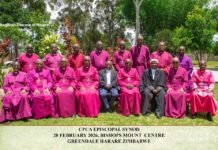A Moscow court fined an Anglican Christian three weeks’ average wage under Russia’s “gay propaganda” law for social media posts citing a Vatican declaration condemning “unjust discrimination” on the basis of sexual orientation and a Scottish Episcopal Church essay on equal marriage. This is the first known time a court imposed such a fine for sharing church documents. Amid ever-tightening laws for opposing Russia’s war against Ukraine, a Buddhist is on criminal trial and a Pentecostal Pastor in pre-trial detention (despite suffering a mini-stroke). Courts fined two religious leaders for violating the “foreign agents” law.
A court in Moscow fined a Russian Anglican Christian three weeks’ average local wage on 18 November under Russia’s “gay propaganda” law for sharing materials from the Vatican and the Scottish Episcopal Church on social media. Police based the case on three posts which Marina P. made in April and May 2024: one which linked to the Vatican’s Dignitas Infinita declaration of April 2024, which condemned “unjust discrimination” on the basis of sexual orientation, another which linked to a Scottish Episcopal Church essay on equal marriage, and a third which noted the recent appointment of a priest in a same-sex marriage to a new role in Edinburgh.
Russian LGBT+ information site Parni+ notes that this the first time a court has imposed such a fine for sharing church documents. It also appears to be the first instance of prosecution for religious content of any kind under Administrative Code Article 6.21 (“Propaganda of non-traditional sexual relations and (or) preferences or gender reassignment”). Amendments adopted in late 2022 significantly broadened the scope of this offence, leading the number of prosecutions to be nine times higher in 2023 than in 2022.
Marina P., a member of the Scottish Episcopal Church, was also fined 2,000 Roubles under Administrative Code Article 20.3 (“Propaganda or public display of Nazi paraphernalia or symbols, or paraphernalia or symbols of extremist organisations, or other paraphernalia or symbols, the propaganda or public display of which is prohibited by federal laws”) for using the rainbow flag in the same three posts (see below).
The state’s communications regulator Roskomnadzor blocked another post on Marina P.’s VKontakte page in June.
Investigative agencies, police, and prosecutors have long used the vague definitions of the Extremism Law, the Demonstrations Law, and the Religion Law itself against religious believers and communities who exercise their freedom of religion and belief outside the confines of state-approved activity, even where this exercise neither infringes on the human rights of others nor involves any political activity (see below).
In recent years, and especially since the Russian full-scale invasion of Ukraine in February 2022, the Russian government has introduced ever more restrictive legislation to curtail and discourage opposition to its policies (particularly the war in Ukraine). This includes both amendments to existing laws, such as those on “foreign agents” and “gay propaganda”, and new laws, such as those punishing the so-called “discreditation” of and “false information” about the Armed Forces (see below).
While not explicitly aimed at religious communities, these laws are increasingly affecting believers in their exercise of the right to freedom of religion and belief.
Religious believers have been prosecuted under all these Criminal and Administrative Code provisions for opposing the war in religious terms or on religious grounds. The criminal trial in Moscow of Ilya Vasilyev, founder and director of the Moscow Zen Centre, is due to resume on 15 January 2025. A Moscow court has extended the pre-trial detention of Moscow Pentecostal pastor Nikolay Romanyuk until 16 February 2025, despite his having suffered a mini-stroke (see below).
On 9 October 2024, Pentecostal Bishop Albert Ratkin, from Kaluga, became the first religious leader still in Russia to be fined for violating the “foreign agents” law. A court in Moscow similarly fined Orthodox Deacon Andrey Kurayev in June 2024, but he has lived outside Russia since November 2023 (see below).
In August 2022, new legislation broadened the concept of “foreign agent” by removing the requirement to be receiving foreign funding and defining almost any activity as “political” if deemed to contradict Russia’s national interests (as defined by presidential decree) or constitutionally protected values.
Further amendments in December 2022 to the “foreign agent” law, the Criminal Code, and the Administrative Code introduced harsher penalties for failing to comply with the requirements and restrictions.
Religious organisations cannot be declared “foreign agents”, but the designation has been used against organisations which promote human rights and monitor their violation, including that of freedom of religion and belief, as well as media outlets and journalists who have reported on such violations.
In April 2022, the Justice Ministry began adding people to the “Register of individuals fulfilling the function of foreign agents”, mostly also journalists as well as politicians and cultural figures. On 27 January 2023, Buddhist leader Telo Tulku Rinpoche (Erdni-Basan Ombadykov) became the first religious figure to be named a “foreign agent”. He has been followed by at least six others to date (see below).
Ever-widening scope for punishment
Administrative Code Article 6.21 (commonly known as the “gay propaganda” law) was introduced on 30 June 2013 and was originally aimed at allegedly “protecting minors from propaganda of homosexualism”.
Amendments of 5 December 2022 broadened Article 6.21’s scope to “Propaganda of non-traditional sexual relations and (or) preferences or gender reassignment” (moving “propaganda” among minors to a separate Part 2). The possible punishments also greatly increased. On 23 November 2024, the Article was amended yet again to include “propaganda of refusing to have children”.
Article 6.21’s eight Parts cover various permutations of the offence, including against minors, by a foreign citizen, and using the internet. This last (Part 3), with which Marina P. was charged, now carries possible fines of 100,000 to 200,000 Roubles for individuals, 200,000 to 400,000 Roubles for persons in an official position, and 1 million to 4 million Roubles for legal entities or suspension of activities for up to 90 days.
On 30 November 2023, Russia’s Supreme Court upheld the Justice Ministry’s request to have the so-called “international social movement LGBT” banned as “extremist”, thus making anyone considered to be “continuing its activities” liable to prosecution under Criminal Code Article 282.2, and rendering the rainbow flag an “extremist” symbol, the display of which can incur charges under Administrative Article 20.3.
Soon after Russia launched its renewed invasion of Ukraine in February 2022, President Vladimir Putin introduced new offences in order to prosecute those opposing the war for any reason, including on religious grounds.
These new offences included Administrative Code Article 20.3.3 (“Public actions aimed at discrediting the use of the Armed Forces of the Russian Federation”), Criminal Code Article 280.3 (“discreditation” repeated within one year), Criminal Code Article 207.3 (“Public dissemination of knowingly false information about the use of the Armed Forces of the Russian Federation”), and Criminal Code Article 280.4 (“Public calls to implement activities directed against the security of the Russian Federation, or to obstruct the exercise by government bodies and their officials of their powers to ensure the security of the Russian Federation”).
Ever-more criminal prosecutions
Religious believers have been prosecuted under all these Criminal and Administrative Code provisions for opposing the war in religious terms or on religious grounds.
Most recently, the trial of Ilya Vasilyev, founder and director of the Moscow Zen Centre, on charges of spreading “knowingly false information” about the Russian Armed Forces “on grounds of hatred or enmity” (Criminal Code Article 207.3, Part 2, Paragraph E) began at Moscow’s Preobrazhensky District Court on 12 December after several delays. He is next due to appear in court on 15 January 2025.
Vasilyev is being prosecuted for an English-language Facebook post about Russian rocket attacks on Ukrainian cities. He made the post – and others for which he was previously prosecuted under Administrative Code Article 20.3.3 – “solely out of religious conviction”, his lawyer told Forum 18. If convicted, Vasilyev could be imprisoned for 5 to 10 years or be fined 3 million to 5 million Roubles. On 19 November, the same court extended his pre-trial detention until 24 April 2025.
In October 2024, Pentecostal pastor Nikolay Romanyuk became the first person to be accused of publicly calling for actions “against state security” for speaking out against Russia’s war in Ukraine from a religious perspective (Criminal Code Article 280.4, “Public calls to implement activities directed against the security of the Russian Federation, or to obstruct the exercise by government bodies and their officials of their powers to ensure the security of the Russian Federation”, Part 2, Paragraph c “with the use of mass media, or electronic, or information and telecommunication networks, including the internet”).
Pastor Romanyuk is being prosecuted for a livestreamed sermon in which he called on fellow believers not to participate in the war in Ukraine.
Pastor Romanyuk has been unwell in detention and was hospitalised for a few days, according to fellow pastor Roman Zhukov, who is following the case on his Telegram channel. Pastor Romanyuk was taken ill again at Moscow’s Balashikha District Court during a hearing on restrictive measures on 11 December, and was later found to have suffered a mini-stroke. The court nevertheless extended his detention until 16 February 2025.
Prosecution for “gay propaganda”
On 18 November 2024, Tver District Court fined Moscow-based Anglican Christian Marina P. a total of 102,000 Roubles on two administrative charges for social media posts about Anglican and Catholic views of homosexuality, which she had made some seven months previously. According to the Moscow court system website, she has not lodged any appeal. The fine represents about three weeks’ average local wage.
As far as is known to Forum 18, this is the first instance of administrative prosecution under Russia’s “gay propaganda” law for the sharing of religious materials.
Police drew up protocols against Marina P. under Administrative Code Article 6.21, Part 3 (“Propaganda of non-traditional sexual relations and (or) preferences or gender reassignment” using the internet) and Administrative Code Article 20.3, Part 1 (“Propaganda or public display of Nazi paraphernalia or symbols, or paraphernalia or symbols similar to Nazi paraphernalia or symbols to the point of confusion, or paraphernalia or symbols of extremist organisations, or other paraphernalia or symbols, the propaganda or public display of which is prohibited by federal laws, if these actions do not contain elements of a criminally punishable act”).
The same judge, Anna Malakhova, considered both charges in consecutive 10- and 15-minute hearings. She fined Marina P. 100,000 Roubles under Article 6.21 and 2,000 Roubles under Article 20.3 (the latter for use of the rainbow flag, now deemed to be an “extremist” symbol).
Forum 18 wrote to the Interior Ministry’s Moscow Directorate on 17 December 2024 to ask why posting church documents is deemed to be LGBT propaganda, and why the promotion from a religious perspective of human rights for all is considered harmful. Forum 18 had received no reply by the afternoon of the working day in Moscow of 20 December.
The court decisions, seen by Forum 18, do not quote the materials in question, but give their dates, on each of which Marina P. made only one post.
In the first of the three posts which formed the basis of the case, Marina P. responds positively to the appointment as rector of an Edinburgh church of a priest who had married his same-sex partner as soon as the Scottish Episcopal Church adopted equal marriage in 2017. “May God bless Fr Oliver in his new parish,” she wrote on 23 April 2024. “I am delighted to be a member of the Scottish Episcopal Church, which champions the rights of all people, including those in the LGBT community.”
On 25 April, Marina P. posted a link to the Declaration of the Dicastery for the Doctrine of the Faith “Dignitas Infinita” on Human Dignity. The Vatican published this document on 8 April 2024, “highlighting the indispensable nature of the dignity of the human person in Christian anthropology and illustrating the significance and beneficial implications of the concept in the social, political, and economic realms”, as it states in its introduction.
“Point 55 of this document expresses condemnation of countries like Russia, where LGB people are declared extremists and sent to prison”, Marina P. noted. She quoted the paragraph in its entirety: “The Church wishes, first of all, to reaffirm that every person, regardless of sexual orientation, ought to be respected in his or her dignity and treated with respect, while ‘any manifestation of unjust discrimination’ is to be carefully avoided, particularly any form of aggression or violence. For this reason, it should be denounced as contrary to human dignity that, in some places, not a few people are imprisoned, tortured, and even deprived of life solely because of their sexual orientation.”
On 2 May, Marina P. commented ironically on the “newfangled” “International LGBT Social Movement” (outlawed as “extremist” in November 2023). She said that if it exists, it should be campaigning for LGBT rights, “For example, by publishing and distributing books with research on the possibility of church marriage for same-sex couples”.
Marina P. also posted a link to an essay by the Doctrine Committee of the Scottish Episcopal Church (“Marriage and Human Intimacy: Perspectives on same-sex relationships and the life of the church”), published in 2014, before the Church adopted equal marriage.
According to the court decision in the Article 6.21 case, a police expert concluded that these posts amounted to “comments containing propaganda of non-traditional same-sex sexual relations, aimed at forming an attractive impression of non-traditional same-sex sexual relations”.
On 24 June 2024, before police initiated the administrative prosecutions, the state’s communications regulator Roskomnadzor blocked another post on Marina P.’s VKontakte page, Parni+ noted in its account of the case. This post, of 23 May, in which Marina P. commented on the anthology “Homosexuality and Christianity in the 21st Century: A Collection of Articles from Different Years”, appears to have been blocked because it included a link to the website of Nuntiare et Recreare, https://nuntiare.org.
Roskomnadzor blocked the website of Nuntiare et Recreare – a multi-faith ministry for LGBT+ believers which held meetings in St Petersburg, provides pastoral care, and collates LGBT-affirmative theological materials on its website – in July 2023.
Marina P.’s VKontakte page remains accessible, but VKontakte has replaced this post in Russia with a notice which reads: “Material blocked on the territory of your country on the basis of Decision No. 2600266, 24 June 2024, of the Federal Service for Supervision of Communications, Information Technology, and Mass Media [Roskomnadzor]”.




… [Trackback]
[…] Informations on that Topic: anglican.ink/2024/12/20/moscow-court-fines-scottish-episcopalian-for-violating-russias-gay-propaganda-law-by-citing-sec-study-paper/ […]